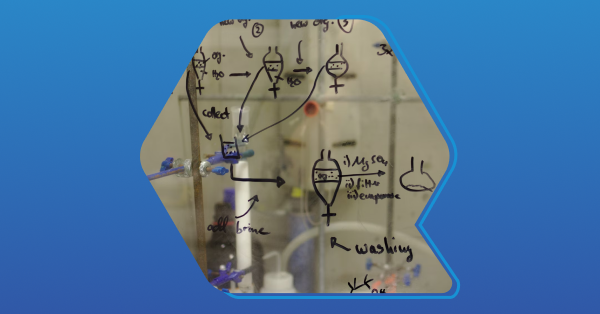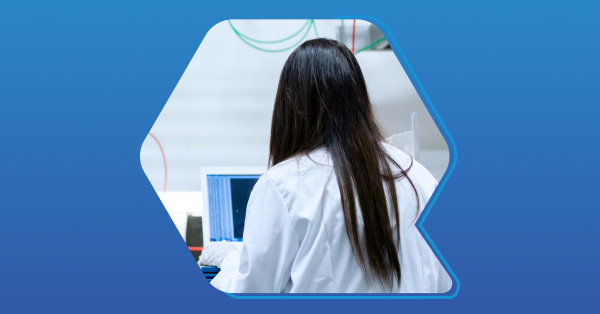The Best Lab Management Software: Updated for 2025

It’s 2025, modern labs need better solutions than pen and paper, spreadsheets, or whiteboards.
Most labs are catching on. Lab data management needs are scaling faster than ever, and to meet them, the lab informatics market is projected to reach $6.2B by 2030.
Cloud-based software is the tool of choice for labs, as evidenced by a recent report by Grand View Research. Between the software platforms cited, LIMS dominate the market while ELNs and others lag behind. In this alphabet soup of software acronyms, which should you choose? One? A combination of platforms?
Lab software can be expensive, with high switching costs to boot, so it’s critical that you make an educated decision that empowers your lab rather than holds it back. In this article, we’ll dive deep into the best software platforms available to labs today to help you make the right decision.
Why Modern Labs Need Software
While pen and paper or spreadsheets can be of help, they can only get your lab so far. With the increasing demands brought on by changing compliance guidelines, new regulations, and higher throughput than ever, data management is suddenly becoming a more complex job for labs.
That’s where software can help to speed things up. For instance, just look at the example from EO Science Lab: after implementing QBench LIMS, tasks that used to take 20-30 minutes were cut down to 2 minutes, freeing up time to focus on higher priorities.
Beyond that, your lab should move toward software because:
- Software improves efficiency and productivity: Software can help your lab save hours of time by automating many manual processes that were once performed by technicians and scientists.
- Software reduces human error: Human error is a costly factor in labs, particularly with data entry. Laboratory software automates data capture, validation, and storage, significantly reducing error risks and improving diagnostic accuracy.
- Software improves data management: Does your lab need to manage data across a distributed team, or manage user-level access to data? Software helps here too. You can manage and store data from various sources, including analytical instruments, sample tracking systems, and laboratory notebooks, while setting role-based permissions for select users to restrict access.
- Software can help with compliance: With increasing healthcare regulations, labs need systems that make compliance effortless. Laboratory software automates compliance tasks, from data logging to audit trails, ensuring critical steps in regulatory reporting aren't missed.
Surprisingly, many large companies – including Fortune 500 companies – still use paper or Excel to manage their labs and process samples. As laboratories face increasing pressure for accuracy, efficiency, and compliance, dedicated software has transitioned from a luxury to a necessity.
The Types of Software Available to Labs
As you go digital, you’ll find a wide range of software options for your lab. The most common are the following:
- ELN
- ERP
- QMS
- LIMS
Let’s compare each one to help you make the right decision.
ELN (Electronic Lab Notebook)
An ELN is a digital version of a lab notebook. An ELN allows your lab staff to document experiments, procedures, and observations electronically. ELNs are best for:
- Recording experimental protocols and methods
- Capturing raw data and observations in real-time
- Supporting collaboration between researchers
- Providing searchable records of research activities
- Protecting intellectual property through timestamps and audit trails
While ELNs represent a step forward from physical documentation, they are limited when it comes to more advanced functionality for sample management, inventory management, workflow automation, and reporting.
ERP (Enterprise Resource Planning)
An ERP is a software platform that businesses use to streamline processes, covering everything from finance to HR. ERPs can be used in labs, but mainly skew towards business-focused functionality. They can:
- Connect lab operations with broader business functions (finance, HR, supply chain)
- Manage resources, equipment, and personnel
- Track laboratory costs and budgeting
- Facilitate enterprise-wide reporting and analytics
- Standardize processes across multiple locations or departments
ERPs are best for large organizations that need to integrate their laboratory operations with overall business management. That said, ERPs fall short when it comes to lab-specific functions like sample management, test workflow automation, and compliance.
QMS (Quality Management System)
For labs looking to improve their compliance practices, a QMS is a great choice. A QMS is a software platform designed to aid in many best practices your lab must follow to pass an inspection audit. A QMS can be used for things like:
- Document control and version management
- Tracking corrective and preventive actions (CAPA)
- Managing audits and quality inspections
- Controlling deviations and non-conformances
- Supporting compliance with quality standards (ISO, GLP, GMP)
- Managing training and competency records
While a QMS offers great compliance functionality, they are less useful for other lab tasks like sample management, inventory management, and workflow automation. When integrated with a LIMS, though, they offer a powerful set of tools to help modern labs scale.
LIMS (Lab Information Management System)
A LIMS is a comprehensive data management and automation platform for labs that can:
- Manage and organize data
- Track samples
- Automate processes and workflows
- Manage inventory
- Handle invoicing and billing
- Create reports on the fly
- Integrate lab instruments
LIMS have evolved into sophisticated systems that support a wide range of laboratory activities, from sample management and quality control to data analysis and reporting. In many ways, a LIMS brings the best of an ELN, ERP, and QMS all in one platform.
What Makes a LIMS The Best Software for Modern Labs
Could you start with an ELN, or work your way through an ERP?
While a few cases can be made for alternative platforms, a LIMS truly is the best all-in-one solution available to labs today.
LIMS Provide Specialized Features for Labs
While ERPs may be powerful, they aren’t nearly as specialized for labs as a LIMS. A LIMS provides key features for labs like:
Unlike other lab software solutions, a LIMS is specifically designed to manage the complete sample lifecycle. A LIMS offers other key features like instrument integrations, barcode scanning, and more to speed up your lab processes and reduce errors.
LIMS Include Powerful Workflow Automation
Most LIMS offer some form of workflow support to automate routine tasks like sample registration, data entry, and results analysis. It’s important to pay attention to whether these automation tools are customizable or configurable.
Customizable automation tools often require custom code and complex development work, while configurable LIMS offer intuitive and easy-to-use solutions in the platform.
LIMS Provide Support for Regulatory Compliance
Regulatory compliance is a 'must-have' for clinical and CRO laboratories in the healthcare industry, not to mention any labs in FDA-regulated industries that need to pass inspections as well.
Modern LIMS are built with compliance in mind, including features for data integrity, audit trails, and security that meet requirements for standards such as 21 CFR Part 11, ISO 17025, and GxP.
While ELNs excel at documenting research, ERPs handle business operations, and QMS focuses on quality standards, LIMS uniquely addresses the core operational functions of modern laboratories – sample tracking, testing workflows, instrument integration, and regulatory compliance – making it the most comprehensive and essential tool for labs today.
What are the best Lab Management Software Platforms?
Which of all the LIMS on the market today will you choose? There are dozens of LIMS available, so to save you time, here are the top five cloud-based LIMS that we’ve found.
We ranked these based on an assessment of:
- Their G2 rankings and reviews
- Their feature set and how well suited they are to modern labs
- Their flexibility and adaptability
- Their implementation timeframe
We’ll walk you through each one so you can compare them side-by-side.
- QBench
- Thermo Scientific
- STARLIMS
- Labware
- Genemod
- Labguru
QBench
QBench is the leading option for labs of all sizes looking to scale operations efficiently.
What sets QBench apart is its highly configurable, flexible approach that puts customization power directly in your hands—no coding required. With software updates released every three weeks, QBench is committed to continuous innovation that adapts to your lab's evolving needs.
That’s not just us saying so.
QBench has earned impressive recognition in 2025, ranking #1 on G2's Highest-Rated LIMS list, Easiest to Use LIMS list, and Highest-Rated LIMS in North America. As a G2 Momentum Leader, QBench has shown an exceptional growth trajectory based on user satisfaction scores, employee growth, and digital presence, outperforming competitors across the Customer Satisfaction dimension.
What is a Momentum Leader? G2 states, "Our Momentum Grid shows the growth trajectory that products have had in their respective spaces over the last year. The Momentum Grid identifies products that are on a high-growth trajectory based on user satisfaction scores, employee growth, and digital presence."
Second-time LIMS buyers consistently choose QBench after experiencing the limitations of legacy systems. Unlike vendor-created, code-driven customizations that lead to slow, costly updates, QBench offers deep workflow configurability and flexible, user-friendly tools for quick workflow adjustments, report modifications, and automation enhancements.
Over 95% of QBench's reviews are from customers in North America. QBench is privately owned by a group of families and software investors with over 30 years of lab experience and a long-term time horizon, meaning that they prioritize building the best culture, continuous innovation, and a business that drives value for customers for many years to come. This is a strong contrast to many of the LIMS owned by private equity firms, where there’s an explicit goal to cut costs, extract as much value from customers in a short time, and then resell the business in 3-4 years. QBench's employees are distributed globally to serve customers across the world, but the majority of critical-role employees (88%) are located in North America.
QBench offers multiple tiers, though their base tier packs a punch. QBench’s Starter tier includes access to workflow tools, reporting tools, no-code configurations, custom fields, user permissions, and more. With all this power, you won’t have to sacrifice ease of use, though.
It’s no surprise that QBench leads several categories on G2, has 112 reviews (as of January 2025), and has earned 4.5/5 stars.
Price: Starts at $249/user/month with a discount for 20+ users
Notable features:
- Configurable automations
- Reports and data visualizations
- Inventory management
- Sample management
- Robust API support
- Billing and invoicing support
- WYSIWYG report template editor
- Integrated QMS
- BI integrations
Industries served:
- Materials & Manufacturing
- Food & Beverage
- Biotech & Life Sciences
- Diagnostic
- Agriculture
- Cannabis
- Environmental
Thermo Scientific
Thermo Scientific is a well-known name in lab equipment, so it’s no surprise that their LIMS would appear on any “best of” list. The Thermo Scientific SampleManager LIMS includes many of the features you’d see in any other LIMS, such as automations, sample management, workflows, instrument integration, and reporting.
Thermo Scientific is a large public company with over 65,000 employees. It is unclear how many of them work on the SampleManager product or where that employee group is located. Thermo Scientific has 111 reviews on G2 (as of January 2025) and 4.3/5 stars. SampleManager LIMS is a truly global product with 37 reviews from customers in North America, 35 from customers in Asia, 12 from customers in Australia, 10 from customers in Europe, and more.
Price: No public pricing is available, but the product is likely priced for large enterprises (e.g., $100,000 per year or more).
Notable features:
- Sample management
- Lab automation and workflows
- Instrument management
- Inventory management
- Collaboration
- Dashboards and data visualizations
- Compliance features
Industries served:
- Contract testing
- Chemical and petrochemical
- Clinical testing
- Clean energy
- Environmental
- Food and beverage
- Forensics
- Manufacturing
- Metals and mining
- Oil and gas
- Pharma and biopharma
STARLIMS
STARLIMS is another highly-rated LIMS on G2, though of the LIMS on our list, they primarily serve large enterprises. Founded in 1986, STARLIMS is also one of the older platforms on our list, giving it a lengthy history in the lab software space.
Price: No public pricing available, but it is very likely that the product is priced for large enterprises. Anecdotally, it’s been said that a contract could be $100,000 or more per year, but this will depend on the size of your lab and use case.
Notable features:
- Automation capabilities
- Batch testing
- Sample management
- Integrations
- Audit trails and electronic signatures for compliance
Industries served:
- Life Sciences
- Agrochemical
- Food and Beverage
- Contract Testing
- Chemical
- Clinical
- Oil and Gas
- Public Health
LabWare
LabWare is a legacy player on the market, having been around since its founding in 1987. They excel at on-premises deployments and serve many large pharmaceutical companies.
The product is a solid option for larger companies looking to digitize their operations thanks to its built-in ELN and LIMS automation features. LabWare boasts a number of automation capabilities along with QA/QC features and instrument integrations. LabWare is customizable and even has its own programming language called LIMS Basic. The latest version of LabWare, LabWare 8, was released on June 12, 2020.
LabWare is privately owned and has 40 offices around the world. Roughly 30% of their staff is in the EMEA region (Europe, Middle East, & Africa), 29% in North America, 23% in South America, and 17% in Asia (according to LinkedIn). LabWare's reviews come from 62% of customers in North America, 19% in Europe, and 11% in Asia. LabWare has over 100 reviews on G2, with the majority of those coming from the pharmaceutical industry. They have an overall rating of 4.5/5 stars.
Price: No public pricing is available, but the product is very likely priced for large enterprises (e.g., $100,000 per year or more).
The pricing that can be found is part of the GSA Advantage program, which is typically the lowest price available and exclusive to government contracts. These prices are unlikely to be available to businesses, but they can help a lab building a vendor short list understand the price range they might encounter. GSA Advantage pricing schedule: Perpetual license GSA Advantage price from 2021 of $7,043.22/user + 14% maintenance fee of $986.05/user/year for continued patches and product enhancements after year 1 + additional costs for access to technical support + additional costs for hardware and IT staff if you choose on-premises deployment.
Notable features:
- Automation capabilities
- QA/QC features
- Instrument integrations
- Sample management
- Reporting tools and data visualizations
Industries served:
- Biopharmaceutical
- Biotech
- Agriculture
Genemod
Genemod is a newer LIMS + ELN platform focused more on inventory management, freezer management, and electronic lab notebooks. They are a relatively small venture-backed team based in Seattle, Washington, with a few global team members. While Genemod offers LIMS functionality, they are primarily an ELN with some LIMS features as opposed to a full LIMS.
Genemod offers a cloud-based solution and aims to be one of the simpler and more user-friendly options in the market. While they serve a number of industries, most of their marketing messaging is aimed at R&D and Biotech labs.
Price: Not available, but their plans are listed on their website.
Notable features:
- Inventory management
- ELN
- Alerts
- Security
- Numerous integrations
- Reporting and visualizations
- AI-powered text generation for lab notebooks
Industries served:
- Biopharmaceutical
- Biotech
- Clinical research
- Gene therapy
- Genetics labs
- Academic Institutions
Labguru
Labguru is a great option for small labs looking to streamline and scale their operations with a focus on simplicity, ease of use, and user-friendliness. Like Genemod, Labguru is what we'd categorize as more ELN-forward and focused on inventory management, but they do offer a LIMS alongside their ELN now. Previously, Labguru was owned by Holtzbrinck Publishing Group, a European publishing house.
As of 2025, Labguru is now owned by Titian Software, a UK-based Sample Management business, which is itself owned by the private equity division of Battery Ventures. Roughly 43% of its staff are located in Europe & the Middle East, 30% in North America, and 28% in Asia.
Like QBench, Labguru is well-reviewed on G2 with a 4.6/5 stars overall, 126 reviews of its ELN product, and 66 reviews of its LIMS product (as of January 2025). 34% of their reviews are from customers in Europe, 32% from the Middle East, and 32% from North America (according to LinkedIn).
Price: Not available
Notable features:
- Built-in ELN
- Inventory management
- Reports and visualizations in premium tiers
- Automation in premium tiers
- API support in premium tiers
Industries served:
- Biotech
- Pharma
- Food and Beverage
- Molecular farming
- CRO/Service labs
- QC Labs
Looking For the Best LIMS? Modern Labs Choose QBench
The LIMS market is growing, but don’t get overwhelmed by the options when looking for the best LIMS of 2025.
If you are looking for a LIMS that provides:
- Robust integrations and API access
- Automation
- Reporting
- No-code configuration
- Ease of use
- Excellent support
Then look no further than QBench.
A LIMS should help your lab work smarter and with unparalleled flexibility to drive whatever the future brings. It’s one of the reasons we’re so proud that this commitment continually gets recognized by G2 and why QBench ranks among the best LIMS of 2025. Click the button below to schedule a demo and see for yourself.






